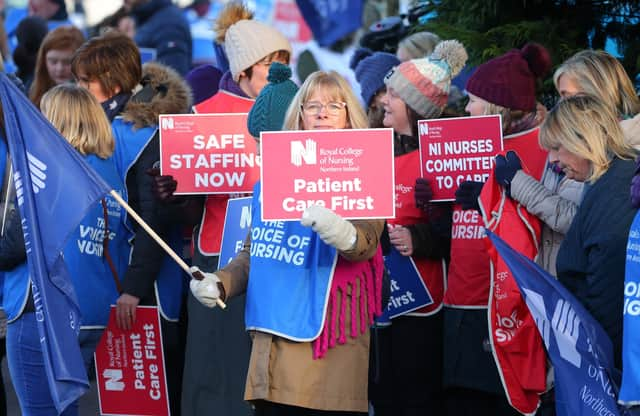Royal College of Nursing: Little has changed in year since our strike in NI


The staffing pressures that helped force the first-ever strike in the 103-year history of the Royal College has made dealing with the coronavirus pandemic “doubly difficult”, the health union’s Northern Ireland director Pat Cullen has said.
At the time, unions had been campaigning for both better staffing levels and pay parity with their counterparts elsewhere in the UK.
Advertisement
Hide AdAdvertisement
Hide AdThe strike came to involve a host of unions and many professions other than nursing, before it was brought to an end after the restoration of the Executive in January, when an agreement was reached with Health Minister Robin Swann on both staffing levels and pay.
Earlier this month, Mr Swann announced that pay lost during the strikes would be reimbursed and expressed hope that “we can all put that chapter behind us”.
That appears unlikely, with the RCN warning that many of the issues that forced the strikes last year “have sadly not gone away”.
“Our members who took this historic action were left with little choice,” Ms Cullen said. “Patient care was being compromised by unsafe staffing levels and nurses’ pay had been left to dwindle and fall behind that of colleagues from across the UK. Last winter we had around 2,800 vacant nursing posts in health and social care and record levels of money being spent on agency staff to plug the gaps.
Advertisement
Hide AdAdvertisement
Hide Ad“2020 has been a year like no other but very little has actually changed and we need to remind the government that many of these issues have sadly not gone away.”
She continued: “The pressures that were caused by not having enough nurses have been fiercely highlighted through the pandemic.
“It is not just the case that we have struggled because of the impact of Covid-19. Because we started out in a worse position, it has made it doubly difficult to deal with.
“While we have seen the commitment to increased numbers of pre-registration nursing students being fulfilled, we have yet to see meaningful progress in relation to safe nurse staffing legislation becoming a reality.
Advertisement
Hide AdAdvertisement
Hide Ad“This was a key point of the agreement that led nursing staff to suspend strike action and cannot be compromised upon.”
The union is now calling for “drastic” measures to try and keep nurses from leaving the health service.
“Finally, actions speak louder than words. We need to do something drastic to keep our experienced nursing staff in the profession and make people want to join,” Ms Cullen said.
“This will only be achieved if we manage to get a fair pay deal for nursing. Right across the UK, we are seeing nursing staff burnt out and leaving. If the pandemic has shown us one thing, it is that this needs to change.”